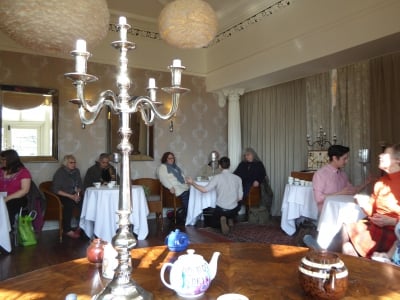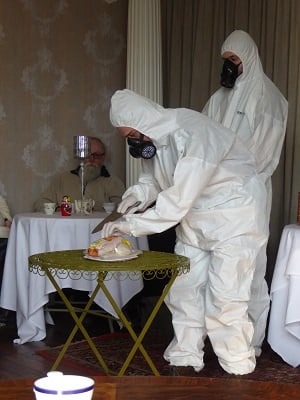Review: The Litvinenko Project at Falcon Manor, Settle
May 3, 2016

If there is anything about a sunny drawing room in a country house hotel that suggests murder, it would surely bring to mind the genteel, early 20th century world of Agatha Christie.
Just such a room in Settle’s Falcon Manor – wainscoted, elegantly furnished and amply equipped with teapots – is the setting for the performance of 2Magpies Theatre’s Litvinenko Project. However, rather than a quaint and whimsical diversion involving unseemly passions beneath tweed and Cluedo-style weaponry, this performance explores 21st century global politics and murder most radioactive!

The company’s Tom Barnes and Matt Wilks start by working the room – a near-capacity audience of almost 30, seated as if for high tea. There’s little separation in the production between viewers and performers, and this begins when we’re asked about our awareness of the story of the murder of Russian dissident Alexander Litvinenko in London in 2006.
It’s clear that many audience members are aware of the poisoning by radioactive polonium of the former KGB and FSB officer who stood up to Vladimir Putin. The newspaper image of Litvinenko close to death is recalled by many, but others point to the anomalies of the case, the mystery of why polonium in a cup of tea was used as the murder weapon and the radioactive trail it left behind.

This feeds into the telling of the story of the (presumed) day of Litvinenko’s poisoning, moving from ballroom dancing with his wife, to tea with businessmen (and possible Russian agents) Dmitry Kovtun and Andrey Lugovoy, on to a meeting with Italian nuclear expert Mario Scaramella and finally to a second encounter with Kovtun and Lugovoy.
As the audience sips green tea (though some of the pots are out of bounds, for obvious reasons!) the story is presented as a mixture of narration and drama, with Barnes and Wilkes taking all the roles except for those peremptorily delegated to members of the audience.
Such effects that might be seen as distancing, in a Brechtian sense, from the drama actually tend to engage, rather than alienate. Even when the pair don radiation suits to simulate preparation the last meal Litvinenko cooked (chicken on a bottle), the stink of the chicken on a warm spring afternoon seems to bring audience and cast together, something symbolically represented by the thread most of us end up holding, criss-crossed around the room, representing the trail of radioactivity left by Litvinenko around London after his poisoning.

This is a different, thought-provoking way of doing theatre and of using the medium to address political questions. It’s also a production whose time has come. It was originally staged by International Security and Terrorism graduates Barnes and Wilkes three years ago, just as the Litvinenko case was fading from memory. Now, though, it shares the zeitgeist with the findings of the Owen Inquiry into the case and several new books on the subject.
At the end of the play, Barnes and Wilkes present a number of facts and probabilities. Although the earlier action strongly suggested that Kovtun and Lugovoy were responsible for the poisoning – and, by implication, that the trail leads back to Vladimir Putin. That’s something that the Kremlin might feel disposed to dispute, but the play marks a fascinating, thought-provoking contribution to the political strand of this year’s Settle Stories programme.
The 2Magpies website is http://www.2magpiestheatre.co.uk/
Details of future Settle Stories events can be found at http://www.settlestories.org.uk/

Comments